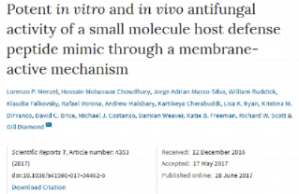Publication of preclinical research and additional lab work supports Innovation’s anti-fungal compound’s activity against multi-drug resistant Candida albicans (C. albicans) and non-albicans species.
Studies conducted by researchers showed that CTIX-1502 (referred to as C4), a Host Defense Protein (HDP) mimic, exhibited potent, dose-dependent in vitro and in vivo activity against numerous fluconazole-resistant strains of C. albicans. Rapid membrane disruption in response to CTIX-1502 was observed. Additional lab work has since revealed the anti-fungal exhibited even greater potency when tested against a Candida species now considered to be a fungal “Superbug” that a recent Forbes article called an emerging global threat.
The published research on CTIX-1502’s potent activity against Candida species can be accessed at the link below:
· “Potent In Vitro and In Vivo Antifungal Activity of a Small Molecule Host Defense Peptide Mimic through a Membrane-Active Mechanism.” Scientific Reports 7, Article number: 4353 (2017)
Another published article describing, more broadly, the therapeutic potential of defensin-mimetics as a novel drug class can be accessed at the link below.
· “Mimics of Host Defense Proteins; Strategies for Translation to Therapeutic Applications.” (pdf) Current Topics in Medicinal Chemistry, Volume 17, Number 5, February 2017, pp. 576-589(14).
About Candida Infections
Invasive, opportunistic fungal infections of Candida species can be lethal and are increasingly common. Candida is the fourth most frequent cause of hospital-acquired bloodstream infections (BSIs) in the United States, estimated to result in an additional 3 to 13 days of hospitalization and $6,000 to $29,000 in healthcare costs. Mortality rates due to C. albicans infections are estimated to be 30 to 40 percent, with some estimates as high as 46 to 75 percent. For cancer patients, often immuno-compromised due to chemotherapy, Candida infections are especially harmful. The average annual incidence of systemic Candidiasis in cancer patients ranges from 71 to 2400 per 100,000 admissions, compared to 10 to 370 per 100,000 admissions in the general hospital population. For multi-drug resistant Candida infections, what few remaining treatment options that are available can be expensive and toxic for patients who already are very sick. (Source)
To learn more, please visit:
https://www.cdc.gov/fungal/diseases/candidiasis/index.html
https://www.cdc.gov/fungal/infections/cancer-patients.html
Source: “Potent In Vitro and In Vivo Antifungal Activity of a Small Molecule Host Defense Peptide Mimic through a Membrane-Active Mechanism.” Scientific Reports 7, Article number: 4353 (2017)
Source: “Potent In Vitro and In Vivo Antifungal Activity of a Small Molecule Host Defense Peptide Mimic through a Membrane-Active Mechanism.” Scientific Reports 7, Article number: 4353 (2017)



